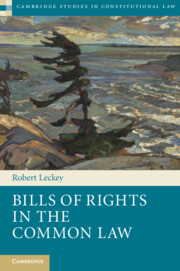Book contents
- Frontmatter
- Dedication
- Contents
- Acknowledgements
- Table of cases
- Introduction
- 1 Against bill-of-rights exceptionalism
- 2 The common law, judging, and three bills of rights
- 3 Judicial review of legislation before bills of rights
- 4 Bills of rights and other means of accessing judgment
- 5 Putting the strike-down in its place
- 6 Remedies from text to practice
- 7 Improving the system and engaging the legislature
- 8 Rethinking remedies and constitutional supremacy
- Conclusion
- Bibliography
- Index
Introduction
Published online by Cambridge University Press: 05 May 2015
- Frontmatter
- Dedication
- Contents
- Acknowledgements
- Table of cases
- Introduction
- 1 Against bill-of-rights exceptionalism
- 2 The common law, judging, and three bills of rights
- 3 Judicial review of legislation before bills of rights
- 4 Bills of rights and other means of accessing judgment
- 5 Putting the strike-down in its place
- 6 Remedies from text to practice
- 7 Improving the system and engaging the legislature
- 8 Rethinking remedies and constitutional supremacy
- Conclusion
- Bibliography
- Index
Summary
In fields such as law, political science, and political theory, scholars have addressed at length what judges do under a bill of rights: they scrutinize legislation and, if they conclude that it violates rights, they strike it down. By comparison, scholars have neglected the how of judicial review: matters of procedure and technique and influential elements of judgments that accompany an outcome on rights. From an empirically grounded perspective that is internal to legal practice, this book contributes to remedying that neglect. Engaging with legal procedure as a contestable site of potentially expanding judicial power, it shows that matters of judging which scholars often dismiss as technicalities have substantial implications for the judicial role, for the judiciary';s relation with other branches of government, and for the legitimacy of rights adjudication.
This book reports and analyses how judges of the highest courts of Canada, South Africa, and the United Kingdom have applied their respective country's relatively new bill of rights to legislation. Its detailed account of judicial activity, set against the historical record of judging before bills of rights, advances the understanding of the effects of rights instruments that empower judges to invalidate legislation and of those that do not. In doing so, it enriches the resources for assessing judicial review from all theoretical or political positions. Speaking to domestic and comparative public lawyers, to philosophers of law who analyse judicial review and human rights, and to political scientists who study courts, the book challenges prevailing characterizations of rights instruments and courts as well as significant ideas current in comparative constitutional research. It also speaks to those debating the appropriateness of adopting a bill of rights or of amending an existing instrument.
Four substantive claims unfold across the book. First, mistakes regarding what is novel about judicial review of legislation under bills of rights weaken the scholarship on recently adopted bills of rights.
- Type
- Chapter
- Information
- Bills of Rights in the Common Law , pp. 1 - 6Publisher: Cambridge University PressPrint publication year: 2015

